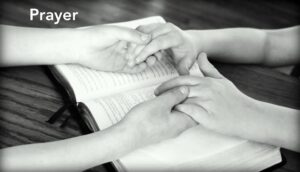Week 5
Addressing Anxiety
Goal
To learn how to overcome fear and anxiety with effective Biblical skills.
- To identify causes of anxiety
- To identify symptoms of anxiety
- To learn ways to overcome anxiety
 Philippians 4:6-7 (NKJV): Be anxious for nothing, but in everything by prayer and supplication, with thanksgiving, let your requests be made known to God; and the peace of God, which surpasses all understanding, will guard your hearts and minds through Christ Jesus.
Philippians 4:6-7 (NKJV): Be anxious for nothing, but in everything by prayer and supplication, with thanksgiving, let your requests be made known to God; and the peace of God, which surpasses all understanding, will guard your hearts and minds through Christ Jesus.
Two Sisters
This was an unusual Sabbath for Mary Magdalene and other women who had seen the crucifixion of Jesus. On preparation day, they had witnessed the horrible scenes of how cruelly their Lord was treated. All of it was disturbing to them. But as Jesus rested in His tomb on the Sabbath day, they, too, had to cease from all their works. Normally, this would be a great joy to rest on God’s holy day. How could they truly enjoy their rest when they were so anxious for the Sabbath to hours to pass by so they could get to Jesus’ tomb?
Very early in the morning on the first day of the week, the women were making their way to where Jesus’ body was resting. They were anxious to get there to anoint the body of Jesus with precious spices. They were as a people without hope, unaware that God had sacrificed Himself in Christ for the redemption of mankind. “God was in Christ, reconciling the world unto Himself” (2 Corinthians 5:19). Like most of those witnessing Jesus’ death, these women, who really loved Jesus, did not comprehend God’s purpose.
Mary Magdalene and the women got to the tomb.
“And, behold, there was a great earthquake: for the angel of the Lord descended from heaven, and came and rolled back the stone from the door, and sat upon it.
His countenance was like lightning, and his raiment white as snow:
And for fear of him the keepers did shake, and became as dead men.
And the angel answered and said unto the women, Fear not ye: for I know that ye seek Jesus, which was crucified.
He is not here: for he is risen, as he said. Come, see the place where the Lord lay.
And go quickly, and tell his disciples that he is risen from the dead; and, behold, he goeth before you into Galilee; there shall ye see him: lo, I have told you.” Matthew 28: 2-7.
The women started on their way to let the disciples know that Jesus was risen from the dead. Jesus, the very One whom they had gone to the tomb to seek, met them. What a moment of excitement for these women! It must have been the most joyful day of their lives. They “held [Jesus] by the feet, and worshiped him” (Matthew 28:9). Jesus charged them not to be afraid in going forth to tell their brethren where they would see Him. Jesus was about to “give them proof that He was their living Saviour, that He had broken the fetters of the tomb, and could no longer be held by the enemy death” (Desire of Ages, p. 793). He would show still more love to them now as their risen Savior.

- Why were the women watching for the hours of the Sabbath to pass? Do you typically enjoy the hours of the Sabbath, or do you anxiously watch for the hours of the Sabbath to pass?
- Why were they anxious to get to the tomb when the Sabbath was past?
- What kinds of emotions do you think they were experiencing on the Sabbath, and on the way to the tomb that Sunday morning?
- What might Jesus say to a person who is low in spirit, and looking to the empty tomb?
- The women worshiped Jesus when He revealed Himself to them. Why is Jesus deserving of your worship?
- How can the reality that Jesus is risen help with anxiety and perplexity?
 How anxiety starts in children
How anxiety starts in children
Research suggests that anxiety may be caused by several factors such as biological, psychological, and environmental factors. To minimize their risk of living with anxiety, children can be taught how to avoid the causal factors in their control. While they may not always have control over certain biological factors, they should be aware that what they hear, see, or experience can significantly determine whether they will develop anxiety.
Many children today have never known life apart from smartphones, social media, terrorism, and global conflict. They have more access to information about what is happening worldwide at their finger-tips. Without clear guidelines and understanding of what they hear, see, or experience, they grow more emotionally overwhelmed about their environment as well as the future. They become anxious about their safety, livelihood, and self-image.
Children's brains are altered significantly when they are overstimulated with negative information and anxiety. As children grow, the way their brains and minds think, process, and interpret the world are largely influenced by the information they take in. When they interpret the world through negative lens and develop fear, their brains' emotional regions are enlarged and overstimulated. Research published by the journal Biological Psychiatry suggests that children with high anxiety levels had a larger amygdala than children with low anxiety levels. This part of the brain had more connections to other brain regions involved in attention, emotional perception, and regulation. The amygdala's function is to assess the emotional significance of things that happen in your environment. In particular, it considers whether or not something in your environment is a threat to you. Overacting the amygdala, however, can keep the brain in a constant state of fear.
The amygdala initiates the brain processes that create both fear and anxiety. It is also responsible for the "fight or flight" responses in the body. The flight or fight response is a healthy part of our biology that is designed to ensure our survival and safety by preparing us to get out of dangerous situations safely, one way or another. However, when your fight or flight response remains switched on when there is no danger, or if it gets switched on too quickly, again when there is no danger, the flight or fight response will morph into prolonged anxiety and anxiety disorders.
Symptoms - What do they look like?
How do you know if a child is struggling with anxiety? Here are some signs that your child is suffering from worries or stress: sleep disturbances, repetitive questions for reassurance, and physical symptoms such as stomach aches or headaches causing your child to regularly miss school. A child may struggle with anxiety if their worries disrupt family life, causing recurrent avoidance of activities and places. Another sign of anxiety is an advanced worry about an activity or event many weeks, days, and hours in the future.
Anxiety may appear in multiple ways. Not all children are the same, so not all symptoms will be the same in each child. A child may show signs of significant fear or worry. They may have trouble sleeping or may sleep too much. Some children become very irritable and angry for no apparent reason. Typically, the child does not know why and cannot explain what made them angry. Physical manifestations such as fatigue, headaches, and stomach issues are also common. These symptoms are typically present when a child keeps worrying to himself.
Children living with anxiety feel as though their feelings and thoughts are actively trying to destroy them.
At the same time, they need to know their feelings are lies that cannot and should never be trusted. They may feel dread and panic, which they can feel in their hearts, throats, or even their stomachs. The sense of impending doom can be exhausting. When this feeling overwhelms them, they need to know that Jesus is more powerful than their anxious thoughts. They can know beyond a shadow of a doubt that God is with them. He does not want them to suffer, and He can heal their minds.
According to the CDC, 7.1% of children aged 3-17 years (approximately 4.4 million) have been diagnosed with anxiety. God did not intend for His children to live with anxiety and worry over things they cannot control. Nevertheless, many children have difficulty coping with worry and fear. Remember, anxiety develops when children cannot move past anxious feelings or cannot cope with them. They begin to experience physical and mental symptoms that interfere with relationships, school, and playtime.
Instead of focusing their minds on their fears, children need to understand how to be still. "To be still' means to rest in God's presence. It is to “stop, cease striving and stop fighting. It means to acknowledge who God is and be in awe of him. Children should learn to see that "every day they are surrounded with the tokens of God's love; every day they are enjoying the bounties of His providence" (2MCP 466.2). As children learn to be still before our Lord, they are less likely to be afraid of what's happening outside of them. They can be taught to turn off what is causing their mind to worry and fret. As they learn to prioritize their time with God and rest, they can war against the battle of anxiety. We are reminded that "many who profess to be Christ's followers have an anxious, troubled heart because they are afraid to trust themselves with God. ...Unless they do make this surrender, they cannot find peace" (2MCP 469.6). Being still with God will provide peace in their minds.
What steps can children take to overcome anxiety?
The Bible proves to be helpful in overcoming anxiety. Though children's anxiety is triggered by events, places, circumstances, and people, at the core of anxiety is fear about the future, fear of the unknown, and the belief that specific things may happen. The teachings of the Bible run directly counter to the fears that cause anxiety. For example, as it relates to fear of the unknown, the Bible teaches that such fear shows a lack of faith in God. God knows the future, and He has a plan for our lives. Therefore, those who allow themselves to be overcome by anxiety and fear show a lack of trust in God. The more trust they have in God, the more confident they will be about future events.
Other fears that the Bible addresses are the fear of death and personal fears. The Bible teaches that death isn't something to fear. A life lived in God's path is designed to help you get to heaven when Jesus comes back a second time, which is the ultimate goal of all Christians. Personal fears also have an impact on many children. For example, children may fear being alone, fear embarrassment and separation anxiety, fear spiders, fear socializing or social anxiety itself. All of these personal fears go against the belief in God. Personal fears can be hard to control, but a strong belief system can help people overcome that anxiety. Never forget that the core of believing in God is about trust over every uncertainty and fear in life. This biblical belief can be used to help everyone stop being anxious.
Once children identify their triggers, they can learn how to implement coping strategies. Below are some essential coping strategies to consider.
Naming the stressor – This is essential for anyone with anxiety. Knowing the stressor helps determine the trigger. It also gives a name to a problem that may be able to be solved. The best solution should then be determined to address the problem.
Music – Multiple studies completed in the early 2000s proved that music is directly related to mood, relaxation, and physiological symptoms. Researchers found that the participants’ hearts began beating slower when they listened to or sang soft heavenly melodious music. When this happens, relaxation takes place. Thus, it is beneficial for children to listen to and learn happy, Christian songs.
Counting blessings – Children can list every blessing they have, and share the blessings they have received or experienced with others. They can even do this in the form of a game. Counting blessings is an excellent way for children to concentrate on the positives.
Show compassion or create a judgment-free zone – Adults should always treat children with kindness, compassion, and a loving heart. They should listen attentively as children share their worries, and avoid interrupting. Once children know they can trust adults with their feelings, they will trust them as their helpers. Children should never be belittled or made to feel ashamed as they share their anxious thoughts.
Prayer – Children should be taught how to pray about their fears. They should learn to go to God in prayer with their worries and fears, as well as to thank Him for His blessings. A Christian adult should pray with them so they can know the structure of prayer, and learn how to approach God both in reverence and in love.

- In your own words, what is anxiety?
- Do you believe children should spend more or less time using social media?
- How many hours do you spend on social media per week?
- What are the saddest or most frightening things you have viewed in the media?
- What is your biggest fear?
- Do you believe children should watch scary things in the media?
- Have you ever been anxious before a test? a presentation? talking to someone?
- What did you do to conquer your fears?
- Explain how prayer works in your life.

- Amygdala: a pair of small, almond-shaped clusters of nuclei near the base of your brain.
- Separation anxiety: very anxious and upset when separated from parents and caregivers; refusal to attend camp, sleepovers, or play dates; worry that bad things will happen to self or loved ones while separated.
- Social anxiety: Strong fear of social situations; very anxious and self-conscious around others; worry about being judged or humiliated.
- Specific phobia: Severe, irrational fear set off by a situation or thing, such as thunderstorms, worry about vomiting, or insects.
- Biological factors include a person’s genes and brain wiring
- Psychological factors includes a person’s temperament and coping strategies
- Environmental factors include a person’s upbringing such as anxious parenting or troubling early childhood experiences and environment.
- Perplexity: inability to deal with or understand something complicated or unaccountable.

See if you can unscramble this Bible text. Start with the word “BE”. This word appears twice in the text.
FOR NOTHING BE BUT IN PRAYER AND WITH THANKSGIVING
LET YOUR GOD REQUEST KNOWN BE THING SUPPLICATION ANXIOUS EVERY BY MADE TO
Ans: Philippians 4: 6 NKJV version

Dear Father in Heaven, thank you for listening when we pray. Please take away our anxious thoughts. Help us to think on things that are true, honest, just, pure, lovely, and of good report. May we learn to count every blessing daily. In Jesus' name we pray, Amen.


